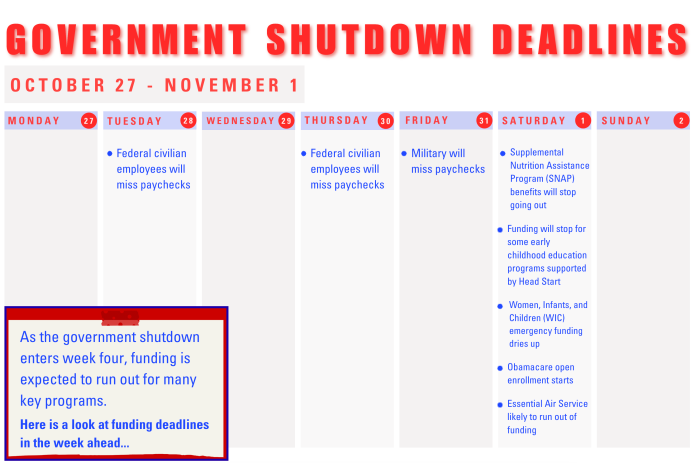Several funding cliffs will hit this week if the federal government shutdown continues, including for food and benefit programs, which are sure to make the lives of many Americans much more difficult.
No signs of bipartisan compromise seem to be emerging as Congress moves into its 27th day of the government shutdown. Democrats and Republicans on Capitol Hill have not found common ground, with Democrats demanding an extension to Obamacare subsidies in return for their support for a continuing resolution to fund the government. The Senate last voted on the resolution Oct. 22. The House still is not in session.
This week, federal workers will miss paychecks, funding for several benefit programs will entirely lapse, and Obamacare open enrollment is expected to show participants hiked premiums. Here’s a look at what’s to come:

SENATE DEMOCRATS TANK SHUTDOWN VOTE ON PAY FOR FEDERAL WORKERS
Civilian and military paychecks will stop
More federal workers can expect to miss a full paycheck this week if the shutdown continues.
On Oct. 24, workers at the Departments of War, Health and Human Services, and Veterans Affairs, and the Executive Office of the President were the first federal workers to miss a paycheck, according to the Bipartisan Policy Center. All other federal agency employees who are funded through normal congressionally appropriated funds will feel the sting of a missed paycheck on Tuesday, Oct. 28, or Thursday, Oct. 30.
Military members are set to miss their paychecks on Friday, Oct. 31, if the Pentagon cannot use an anonymous $130 million donation and if the Pentagon and White House cannot move around already-appropriated funds again to pay the troops.
SNAP runs out and states risk funding without reimbursement
Supplemental Nutritional Assistance Program benefits will not be distributed to millions of Americans in November. Food stamps were already distributed throughout October, but these benefits do not extend into November and will expire on Nov. 1.
After 25 states had initially announced they would not receive November SNAP funding, several individual governors took steps to feed those who would be affected by the food program cuts. Govs. Glenn Youngkin (R-VA), Jared Polis (D-CO), and Josh Green (D-HI) are among those who took steps to address the gap in food assistance by authorizing emergency state funds or calling on state legislators to appropriate funds.
Sens. Josh Hawley (R-MO) and James Lankford (R-OK) have the Keep SNAP Funded Act sitting in the Senate appropriations committee to provide relief for SNAP participants during the shutdown.
The Department of Agriculture announced that contingency funding wouldn’t be used to cover SNAP payments because it needed to be kept in case of an emergency, such as a hurricane. In the same memo, the USDA said that states that temporarily fund the program should not expect to be reimbursed.
“There is no provision or allowance under current law for states to cover the cost of benefits and be reimbursed,” the agency said.
Head Start programs
About 140 Head Start programs will not receive operational funding starting on Nov. 1, according to the National Head Start Association. The HHS program, which supports several early childhood education programs, will cease for about 65,000 children due to the government shutdown.
The cuts will affect early learning initiatives, nutrition programs, and health services in 41 states and Puerto Rico, according to the NHSA. Florida will be dealt the heaviest blow, as cuts will affect over 10,000 students in the Sunshine State.
WIC benefits
The emergency White House funds used to extend the Special Supplemental Nutrition Program for Women, Infants, and Children using tariff revenue are not enough to sustain the program into November. The National WIC Association said an additional $300 million is necessary to maintain the program benefits for the first two weeks of November.
“WIC is a lifeline for nearly 7 million pregnant and postpartum women, infants, and young children. Even short-term disruption to WIC’s healthy food benefits, lactation support, nutrition education, screenings, and referrals can have long-term negative impacts on families,” National WIC Association president and CEO Georgia Machell said in a statement.
The National WIC Association said the White House funds have quickly depleted, and several states project that the funding will be exhausted by Nov. 1, though they did not specify which states would be affected.
Other things to keep an eye on
Since the early days of the shutdown, Transportation Secretary Sean Duffy has warned of a lapse in funds for the Department’s Essential Air Service program, which supports rural fliers. When Duffy secured $41 million in additional funds for the program on Oct. 8, the Transportation Department said the supplement could last through early November. Now, the program will likely run out of funds this weekend, according to Politico.
NEXT GOVERNMENT SHUTDOWN OFF-RAMP OPPORTUNITY COULD BE NOV. 1
Nov. 1 is also the day Obamacare’s open enrollment starts, as premium costs are expected to rise drastically for participants.
The Department of Housing and Urban Development has also warned that by the end of November, Section 9 public housing programs could run out of money, according to the Gothamist.
